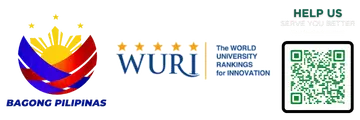
September 26, 2024 – Under the initiative of President Arnel B. Millesca, DEBESMSCAT participated at the World University Rankings for Innovation (WURI) 2024 Global Conference at aSSIST University in Seoul, South Korea, on September 24-26, 2024. Represented by Vice President for Academic Affairs Dr. Elreen A. Delavin and International Relations Officer EnP. Jofer B. Asilum, DEBESMSCAT’s first participation in the global conference marks its commitment to learn from the best practices of its fellow higher education institutions and apply for the 2025 rankings by the end of 2024, as it endeavors to become a globally focused university in the Province of Masbate.

On the first day, EnP. Asilum got elected as a member of the Board of Directors of the World University Network for Innovation (WUNI) for Experts to be chaired by Dr. Jude William R. Genilo, the Pro Vice Chancellor of the University of Liberal Arts Bangladesh. Meanwhile, the WUNI for Presidents is to be chaired by Dr. Ho Hwan Chun, the President of Tongmyung University in South Korea, which is expected to host the WURI 2025 Global Conference. On the second day, the participants from Philippine higher education institutions met with the Ambassador of the Philippines to the Republic of Korea, H.E. Maria Theresa B. Dizon-De Vega for a courtesy call, wherein she introduced the programs of the Embassy of the Philippines in South Korea regarding research and higher education linkages. Lastly, on the third day, Dr. Delavin and EnP. Asilum served as discussants for their assigned breakout sessions.

The three-day conference showcased the innovative projects of the WURI-ranked universities from around the world. Among the innovative projects presented were the Center for Sustainable Development of National Donghwa University of Taiwan, that successfully integrates the environment, society, and governance (ESG) principles in their university’s management and infrastructure systems. Other projects include the artificial intelligence-assisted module development of the Cebu Institute of Technology-University of the Philippines, which significantly minimized the time needed for module development in their university, and the DhanDrishti-Pan India Financial Literacy Project of Christ University of India, which improved the access to financial resources of their students from marginalized groups, such as women, and consequently, enhanced their academic mobility.

The WURI system presents itself as an alternative to the dominant global university ranking systems, becoming an open platform for smaller universities, particularly on how they innovate themselves amidst a rapidly changing and increasingly competitive world. It focuses on thirteen categories, which are generally grouped into two, namely, the categories regarding the Innovation Target (Innovate for whom?) and the categories regarding the Innovation Means (Innovate how?). The former includes 1) Student Support and Engagement, 2) Student Mobility and Openness, 3) Industrial Application, 4) Entrepreneurial Spirit, 5) Crisis Management, 6) Social Responsibility, 7) Generative AI Application, and 8) Support for Global Resilience, while the latter includes 9) Leadership, 10) Funding, 11) Infrastructure/Technology, 12) Symbol/Promotion, and 13) Culture/Values.











 Ladies and gentlemen,
Ladies and gentlemen,

